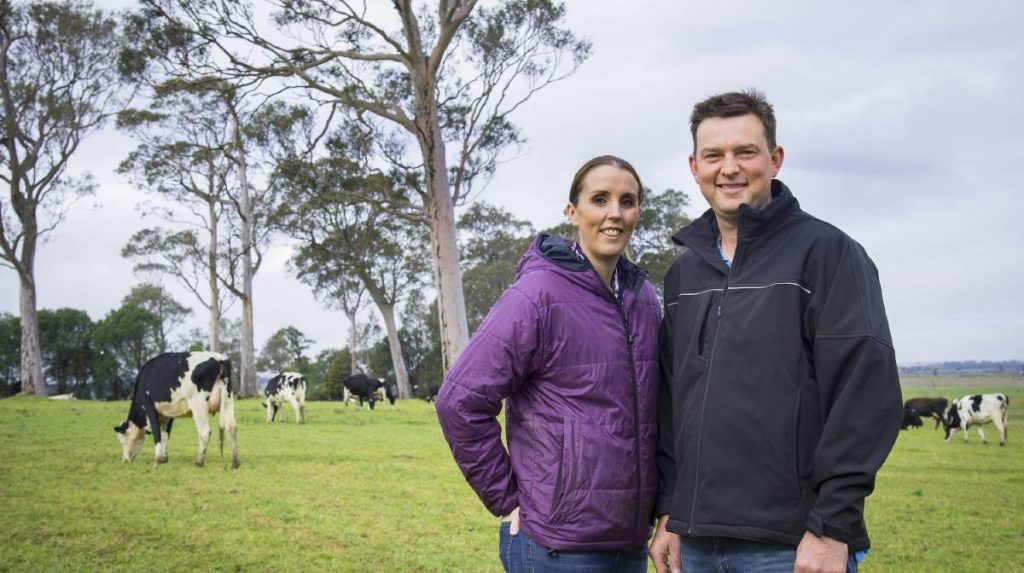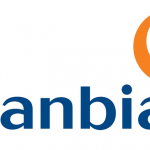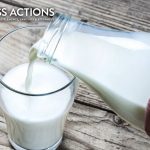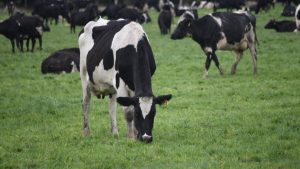
The South Coast farmers recently took over the family farm from Mr Walsh’s parents after a period of succession planning and saw the transition as an opportunity to set up their operation for success.
Now 15 months into the two-year program, Mr and Mrs Walsh have made significant inroads to drive down their cost of production and increase their profit margins.
“Focus Farms is one of the best and most valuable programs that Dairy Australia runs,” Mr Walsh said.
“Through the program, we now have a solid base to easily assess improvements in our business for the long-term, as well as access to an enhanced level of analysis of our unique situation to inform decision-making.”
Achieving tangible outcomes
When he entered the program in August 2018, Mr Walsh identified his pasture and fertiliser management approach as a key area for improvement to drive profitability.
Despite securing a high milk price in recent years, Mr Walsh said it was challenging to realise the benefits due to his high cost of production.
“Our main objective was lowering our cost of production and a key goal was growing more grass,” he said.
Mr Walsh set a goal of doubling his tonnage per hectare by the end of the program and he is already well on his way to success.
Adapting his pasture and fertiliser programs after receiving advice from his support group, Mr Walsh has moved toward planting the entire milking platform with a combination of ryegrass and oats.
The Walshes also used widespread suppression of kikuyu to plant ryegrass earlier in the year to get more grazing out of each season. The result, that while the South Coast experienced one of its driest seasons on record, the Walshes achieved a 50 per cent increase in dry matter tonnage a substantial boost of two tonnes per hectare.
Connecting with farmers and advisers
The Walshes have found the best part of the Focus Farm program has been connecting with other farmers and service providers who offer more micro-level advice on their operations.
Their support group is comprised of nine local farmers and six service providers, including a nutritionist, an agronomist, a feed specialist, a Dairy Australia representative, a processor field officer, and a farm business consultant. Together, this network provides advice on a range of opportunities for improvement in the Walshes’ farm business operation a unique opportunity to draw from a variety of skills and perspectives to make informed decisions.
For Mr Walsh, the key benefit of this network has been receiving tailored advice that looks at every aspect of his farming operation with a better understanding of his unique situation.
Having already used DairyBase to compile and compare his farm data using “the same language as other farmers”, Mr Walsh saw Focus Farms as an opportunity to generate real-life comparisons using knowledge provided by farmers and service providers in his region.
“Participating in the Focus Farm program was a real opportunity to bring these people together I wouldn’t have had access to the depth of knowledge that was provided to us without this program,” he said.
“Your support group gets to know the intricacies of your farm business, rather than the high level or general advice you would usually receive.”
As well as immediate access to an experienced support group, Mr Walsh has broadened his network through referrals and signposting.
“You can do a lot of networking through people in your support group and I now have contacts for specialists for hay or for repro that I wouldn’t have had before,” he said.
“The networking is unbelievable through this program you don’t really understand how wide-reaching this program can be until you’re in.”
Reward for openness and transparency
While he was initially uncertain about the benefits of sharing detailed information about his farm with others in the industry, Mr Walsh said he had been rewarded with stronger relationships and better advice.
“The process can be a little confronting at first, but my wife and I decided that unless people understood the financial position we’re in negative or positive it was very difficult to provide sound advice,” he said.
“While it was confronting, we knew our support group would use their professional discretion, and it puts them in a much better position to provide advice about our farm.”
Since openly sharing information about his farming system, Mr Walsh believes other farmers have repaid his openness with more informed discussions and insights. “I find that people reciprocate your openness you can have much better discussions because people can see you know what you’re talking about and that you’re being up front,” he said.
“The vast majority of dairy farmers are facing similar situations or decisions, and people are definitely more open toward us now that we’re more open to them.”

























